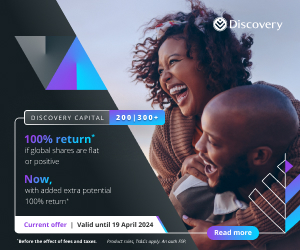Macdonald will be speaking at the Humans Under Management (HUM) conference on 13 October 2022 in Cape Town. HUM is for financial planners who are interested in improving client outcomes by focusing on the human side of their advice.Get your tickets at https://www.humansundermanagement.com/southafrica2022.
In 2020, Warren Buffett said on CNBC, “I don’t own any Bitcoin, I don’t own any cryptocurrency, I never will. It’s probably rat poison squared.” Buffett was similarly sceptical of the technology bubble in the late 1990s, when investors believed that “dot com” behind the name of any listed business guaranteed riches beyond any other type of business. Bill Gates, in June this year, said at a tech conference that the phenomenon of crypto is “100% based on greater fool theory”, which suggests that overvalued assets will go up in price when there are enough investors who are willing to pay more for them. “I’m not involved in that,” Gates said. “I’m not long or short any of those things.” He said that he is more used to “asset classes… like a farm where they have output, or like a company where they make products”.
I have no doubt every financial planner on the planet has had clients asking them about cryptocurrency, “What do you think of it as an investment?” What the client is really saying is, “Wow, that looks exciting. I want a piece of the action.” Much data and research show that over the long term, the most liquid, highest returning regulated investments (listed equities) deliver average annual real returns around 6% (international) and 7% (local) above inflation. Yet, whenever there seems to be an opportunity for higher returns, clients want it. In dealing with these wants from clients, we usually get caught up in discussing the merits (or not) of the investment. A different approach would be to consider that it’s not about the investment, it’s about the investor, which means we need to focus on the person, not their money.
Personality is more complex than a risk profile. It is not only about how someone shows up in the world, but what drives their behaviour, and is built on a multiplicity of factors, both genetic and contextual. Understanding your client’s personality is important.
With this in mind, much work has been done and continues to be done on the impact that cognitive and emotional biases have on our financial decision-making. Despite the insights that research into behavioural finance have generated in this area, client decision-making, especially in the area of investments, remains a challenge. The stampede for the exit from risk assets when Covid-19 hit is a case in point. As was the stampede for the entrance when crypto coins promised riches that other supposedly more boring investments like listed equities could not match. The rise and fall of crypto has once again demonstrated the power of the herd. It is social pressure that enables so many people to fall foul of the “greater fool theory”. Inevitably when a client asks you about an investment, they know somebody else who has made that investment. But these factors do not adequately explain why clients keep falling foul of poor investment decision-making.
In his book, The Psychology of Money, Morgan Housel makes the point that “building wealth has little to do with your income or investment returns, and lots to do with your savings rate”. Again, it’s not about the investment, but about your client’s savings habit, which begs the question, what influences a client’s ability to save? One is a simple nudge like an automated contribution to a retirement annuity (RA) or unit trust investment. But even such a nudge is not foolproof. Clients find ways around them. I believe we need to understand the person more deeply in two ways.
Firstly, a client’s personality will influence their inherent ability to save or not. And when I mean personality, I don’t mean risk profile. Possibly the greatest damage to helping clients get the investment outcomes they need has been the concept of a person’s risk profile. A client may be risk averse by nature, but their investments may need as much risk as possible to counter a late start to saving.
Personality is more complex than a risk profile. It is not only about how someone shows up in the world, but what drives their behaviour, and is built on a multiplicity of factors, both genetic and contextual. Understanding your client’s personality is important. Analytical clients may need your help to make decisions. Enthusiastic extraverts may need you to slow them down and not rush into decisions. This is important work, especially when it comes to investing.
The second key influence on a client’s ability to save is their relationship with money.
Whether we have money or not, we have a relationship with it. In fact, our relationship with money is probably the longest relationship we have with anything. Our relationship with money starts when we are in the womb, which means it is being formulated even before we get into the womb.
Warren Buffett famously said that he won the Ovarian Lottery. He was born into a middle-class American family which he acknowledges laid the foundation for his fascination with, and pursuit of, making money. He lived in a neighbourhood where people read newspapers. This meant he could start earning money as an 11-year-old by delivering newspapers. As he points out, if he had been born in a rural village in Africa, his opportunities in life would have been very different. And he would have had a very different relationship with money.

So, our relationship with money starts in ways unique to us. I was born into a family where as the youngest of five children, I no doubt introduced an additional financial burden to an already financially stretched situation. Or that is the story I tell myself. As David Krueger, author of Your New Money Story, says, “Money relies on the meaning we assign to it.” My money story is one of scarcity rather than abundance. To compound this, both my parents had lived through the hardship of the Second World War, and all the frugality that this entailed. My mother’s father lost all his savings on the stock market, after his retirement. My father lost his mother at the age of 14. He and his three brothers knew frugality long before the war years. So my money story starts in the womb as one of scarcity and my relationship with money has been challenging ever since. Often a source of stress rather than pleasure.
Now this money relationship is a complex thing. To a lesser or greater extent, my four siblings received the same messaging, but interpreted it differently from me. We each process the world according to our own perspective. As Anais Nin says, “We see the world as we are”, which is why having an understanding of each client’s unique personality is so important. The real challenge with our relationship with money is that it is difficult to walk away from. We can’t get divorced from money unless we live in isolation on a desert island. The emotional relationship we have with money is deeply embedded. And it unknowingly will influence our decisions, not just about money but about life, for the two are so inextricably linked. So, in a sense we have a hidden guide to our financial decision-making which may impede, or in some instances improve our financial outcomes.
Unless we make our money story conscious, understand the nature of our relationship with money fully, and if need be, change our money story, we run the risk of not living fully and making sub-optimal choices about money and life. Our brains are storytelling machines. We tell stories about ourselves, and as David Kreuger says, “These stories both describe and determine what we do.” Without knowing a client’s money story, and understanding their relationship with money, I believe it is very difficult to give optimal advice. More importantly, if a client does not understand their money story they will not be conscious of the dynamics in their relationship with money and may struggle to take and implement appropriate advice.
I have no doubt better client outcomes come from focusing on the person who is your client and not going down the rabbit hole of the latest investment hype. Especially if, as the greatest investor of our time says, at the bottom of that rabbit hole is “rat poison squared”.












